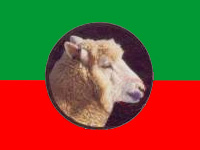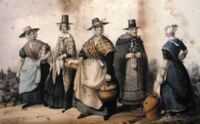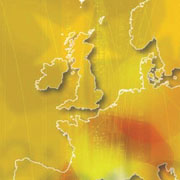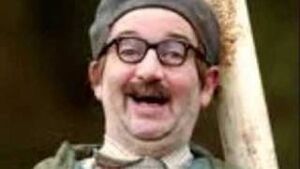Wales

|
This article or section may be Overly British. Americans may not understand humour, only humor. Canadians and Australians may not understand anything at all. Don't change a thing to remedy this. |
|
|||||||
| Motto: Cymru am byth (Wales exists) | |||||||
| Anthem: Hen Wlad Fy Nhadau("It's not as bad as you think") | |||||||
| Capital | Llanfairpwllgwyngyllgogerychwyrndrobwllllantysiliogogogoch | ||||||
| Population | 3,000,000 people 10,000,000 Sheep | ||||||
| Official languages | 0% Welsh, 75% regional variations of Welsh, 95% English, 5% Inarticulate | ||||||
| Government | Yes. | ||||||
Wales or Cymru is a country that forms part of the United Kingdom or Teyrnas Gyfunol. It has an extensive coastline and has a number of mountainous areas, most notably Snowdon or Yr Wyddfa. One of the proudest Welsh achievements is the spreading of their language into absolutely every part of life in Wales, although the only obvious impact that the language has had upon modern Wales is that it prompts motorists to drive more slowly in order to accommodate the additional time required to read the road signs; a procedure that normally involves reading the Welsh, failing to understand it in any way and immediately searching for the English translation, all while still behind the wheel.
Wales established itself as a country shortly after the departure of the Romans in the 5th century - before then it was proudly known as "Britannia" and the language called "British" (effectively a giant middle finger to Scotland). On their departure the Romans took a number of things with them; plumbing, infrastructure and almost all of the vowels. Strict vowel rationing has been in force in Wales ever since, with amusing names like "Llywelyn ap Gruffudd" displaying the most vowels one is ever likely to see in one place.
The country is often described as having a great deal of "cultural identity" and it is difficult to argue that this is not the case. It is much easier to argue that in this case the phrase cultural identity is a euphemism for "sheep" and "rain" which Wales has in abundance all year round. The Welsh have worked hard to establish themselves as a nation of song, there being very little else to do whilst travelling around Aberystwyth, apart from consuming copious amounts of cider and tobacco, which roughen the throat to allow proper Welsh language conversation. In south Wales, however, where Welsh is not spoken as much, Bacardi and Coke is consumed instead. The country also boasts a Rugby Union team of sorts, and while supporting the Rugby team is not compulsory, almost everybody does as supporting the football team is quite a depressing experience - for there is no team to support, only one man named Gareth Bale who doesn't even play in Wales.
There is an area in Wales known as "north Wales", which England forgot about while invading and as a result is the only area in the country to actually speak Welsh. However, England still does not acknowledge their existence and despite attempts to get people to pay attention to them, nobody outside of Anglesey, Gwynedd or Conwy actually acknowledges north Wales. This might also have something to do with the fact many southern Welsh people can't actually point north, as their schools don't teach them directions.
History[edit]
Wales has been inhabited by humans for some 29,000 years, which just goes to show that it was once a lovely place to live. Wales was once a small collection of about 18 smaller states, each with their own dialect, farming methods and tolerance towards the other states. Wars between the smaller states eventually led to a successful victory for the states of Dadlau and Rhyfel[1]. That is until war broke out again and the in-fighting continued and would probably still be going to this day had the Romans not arrived in AD 48.
The Roman Conquest and beyond[edit]
The fear of conquest that rushed through the Welsh heartland when the Romans invaded Britain encouraged them to stop fighting each other over the correct spelling of the word "Peace" [2]. Thirty years of fighting followed, this mostly involved running down steep hills in loincloths and then running back up them again, a strategy the Romans evidently found quite vexing as it took them 30 years to subjugate the most "spirited" tribes; the Silures and the Ordovices. The Welsh retreated onto Ynys Mon, a previously ignored wasteland which, for the first and last time, became important and noteworthy for a brief while, so at least the geography was the real winner.
Roman rule in Wales lasted over 300 years, evidently the Romans saw something in Wales that modern tourists consistently fail to see, perhaps it didn't rain quite so much.
The departure of the Romans in 540 AD threw Wales into turmoil, having spent several centuries being "encouraged" not to kill each other by the Romans, many did not feel that a return to the ways of their ancestors would prove to be the most beneficial solution. This problem was quickly solved by the arrival of the Goths, who unsportingly killed thousands in the southern regions of Britain. Eventually the kingdoms of Gwynedd, Powys, Dyfed and Seisyllg, Morgannwg and Gwent emerged as independent Welsh states. These Welsh states tirelessly worked together to establish the fair division of Wales and its sovereignty from England. Not really, they started a war with each other that only ended when they agreed that the only people that they hated more than each other were the English, so fought with them instead.
You may be getting the impression that the Welsh were a very unpleasant and disagreeable people, this is of course not the universal case, they were all very unpleasant and violent people.
A Legislature of their Own[edit]
After the separation from England in 1974 Wales held a referendum on whether to forget about politics and live the simple life, or to establish some sort of legislative body. The vote was a crushing defeat for the supporters of politics when the only person who bothered voting flipped a coin and decided on a simple life.
By 1997, however, the Welsh were growing restless. The lack of a legislative body had deprived them of their greatest pastime, arguing. Therefore they decided to form the Welsh County Council. Although officially based in a greenhouse in Cardiff Bay, the members usually meet every other Thursday at Clwb y Bont in Pontypridd. Not only has it been a great arena for arguing, petty point scoring and big boasts (again, the bastions of Welsh sport) but, quite unexpectedly, it has improved the lives of the Welsh population. Most analysts accredit this to the Council’s immense wealth which it has amassed by threatening the European Union with the possibility of dumping thousands of annoying horns outside the stadiums of every professional team on the continent. To keep Wales at bay the EU funds its every whim.
Some of the most high-profile schemes funded by the County Council include the popular game-show Dr Who?, keeping Charlotte Church in England, half price pints for under 16s on a Thursday across Wales and free travel for people with three legs on local bus services between 11pm and 1am in the Valleys. The rest of their budget is spent on supplying the Department for Racial Diversity and Linguistic Purity (Welsh: Bwrdd Croeso i Gymru Saeson Ewch Adref) with paper napkins and plastic coffee stirrers.
Civil War[edit]
Recently the Welsh have been living under the cloud of a Cold Civil War, begun shortly after the establishment of the Welsh County Council. While the whole point of the body was to encourage arguing and fighting, the Welsh appetite for such actions was clearly underestimated. The County Council poured resources into the Southern areas, building icons such as the Centurion Stadium, the Armadillo Centre and, of course, the Greenhouse Council House.
The buffer zone between North and South is known by its own, internal inhabitants as "Mid Wales". Borders are disputed, but are believed to originate somewhere between Pwllheli and Aberystwyth. However, in official parlance the term "Demilitarised Zone" is preferred, as the British army is currently engaged in conflicts abroad, in Afghanistan and Croydon.
While Southern analysts have put the blame purely on the shoulders of what they deem the jealous North, Northern analysts claim the same in reverse, that is, that the South is simply jealous of the fact that North Wales got Rhyl.
Fears of Disintegration[edit]
Notwithstanding the impending civil war, there is a real fear of the disintegration of Wales. The 4th biggest, and some say most influential, city in Wales, Llandwrog, has recently been pushing for independence. Their claim lies in a thousand year old poem “Wylit Wylit Llandwrog, Wylit waed pe gwelit hyn”. Other towns that appear to be following suit include The Millennium Stadium, Borth, Portmeirion, and, most disturbingly of all, the Brains Brewery. Newport recently announced their intention to seek independence, but no-one in Wales seemed to care.
In 1259 the Last King of Wales, Llywelyn the Daft, decided to try and cut Wales off from England, and float off somewhere warmer, Australia probably. So Llywelyn set all the men of the kingdom to dig down as far as they could until they reached the bottom of the sea, and they could float off. The Englishmen helped as well, because they were sick of the sight of the Welsh people as well, and the smell of cheese. Obviously, with a medieval understanding of geology the whole enterprise was doomed to failure. To take their revenge, Llywelyn's men cut off his willy, to the cry of "off with his dick". There is a permanent trench between Wales and England, named after Llywelyn's method of death disgrace, these days known as Offa's Dyke. The Welsh people never forgot this ambition, and when they discovered Australia they named it New Wales, but again the English people foiled their plans, and only New South Wales remains of this.
Geography[edit]
The landscape of Wales was the largest single project ever undertaken by the BBC. In readiness for the filming of Torchwood, Wales was constructed over a prolonged period of time on a disused sound stage, just west of Bristol. The BBC only allowed the filming of Gavin and Stacey on condition that one of the settings for some key characters was changed from 'somewhere else in Essex' to Wales. The people of Wales are so dedicated to their roles as supporting characters in these programmes that, if asked about it, they will even feign annoyance.
Much of Wales's diverse landscape is mountainous and consists of four main mountain ranges known as Snowdonia, Cambrian, The Brecon Beacons and Mordor. The mountainous areas of Wales are used primarily for agriculture and are heavily populated with farmers, farmers' wives, dragons, sheep, tourists and orcs.
The beauty of the Welsh landscape attracts many tourists and hobbits to the country each year, and in an effort to avoid this and confuse potential tourists the Welsh government passed a law to remove over 55% of all vowels used in the place names of its towns and villages. The results of this law were mixed as tourism continued to flourish; on a more positive note, however, incidents of hobbit hooliganism took a drastic fall.
Unlike many other countries of its kind, Wales is completely and utterly invisible. If viewed from above, you will merely see an extension of the Catlantic ocean, and all aerial photographs or satellite images of the area are purely artists' impression.
Climate[edit]
- Highest maximum temperature: When the sun comes out (albeit covered by rain clouds) and the temperature reads -10 degrees Celsius.
- Lowest minimum temperature: You'll know when the air is frozen
- Minimum number of hours of sunshine in a day: N/A
- Average yearly rainfall in MM: Infinity
- Yearly sunshine: At best, 0 hours, at worse -12 hours.
- Note South Wales is closer to the equator. North Wales is temperate
- Average temperature January July
Cardiff 25C 40C Llandudno 14C 28C Bridgend 24C 39C Aberystwyth 20C 33C
Thunderstorms FREQUENTLY occur in South Wales, NOT North Wales. In the south, the storms are severe with frequent lightning and tornadoes while the north only has a few flashes with rumbles.
Sport[edit]
The national sport of Wales is arguing. A Welshman takes great pride in his ability to argue with anyone for no apparent reason, even if secretly he agrees. Being from a different county/town/village/street/house/side-of-the-bed of someone else is usually enough to guarantee a fight, while supporting a different rugby team guarantees a war. Northies and southies are guaranteed to start arguing if they come within close contact with each other. Neither side can understand what the other is saying, and thus the arguments mostly always end in a draw. The only time when Welshmen refrain from arguing with each other is when there's an Englishman present. In such a situation the Welsh become brothers-in-arms and turn on the intruder, with whom they disagree completely.
Following the unwritten laws of national sports, which states that every country has to be good at something, the Welsh are quite skilled in the art of throwing a ball around. In one memorable match they managed to throw and catch the ball a stunning 21 times. The English struggle with this, and are often prone to fits of jealousy; during one match, the Englishmen in the crowd began throwing crumpets at the Welsh players. However, it must be noted that the Welsh have thus far failed to win any significant international tournament and indeed were incapable of beating the fearsome nation of Fiji in the last world cup.
Historically, the Welsh have been world-beaters in the popular sport of "Burn the Englishman's Holiday Home". Meibion Glyndŵr were the big league team of this sport, the equivalent of Manchester United or Liverpool FC. Because the English are actually decended from German ancestors, they had no sense of humour and didn't see the funny side in having their expensive luxury homes burned to a crisp. Unfortunately for the Welsh, this sport was outlawed in 2003 due to EU constraints on carbon emissions.
A popular sport is the Welsh Pentathalon, which is a team sport consisting of four events: male voice choir singing, spoon carving, origami, and male voice solo. A by-product of this has been the mass migration of those with brains to the South East of England.
The traditional English game of Countdown was invented in Wales. However, this game proved to be troublesome due to the distinct lack of consonants and space for the long words, such as Llanfairpwllgwyngyllgogerychwyrndrobwllllantyseiliogogogoch.
Library[edit]
There is one Library in Wales. This is called "The National Library" and is situated in Aberystwyth. It has a collection of over 40 books and is world renowned as being the only library in the world with more staff than books.
Culture[edit]
Eisteddfod[edit]
A popular annual event is that of the Eisteddfod (lit. Empty Tent).
The Eisteddfod is considered the most important event in Wales. Loads of dirty old men dressed up in bedsheets and table cloths ogle scantily-clad little girls and boys frolicking about in an orgy of self-adulation. (Perverts to the rest of you.) Children and near-death grannies parade in a gigantic empty tent, trying to remember more Welsh words than the person before them. Everyone between the age of 12 and 31 is at the Youth Village (Maes-B) drinking 98% vodka out of plastic cups. Everyone between the age of 32 and 54 is in caravans, drinking 98% vodka out of crystal glasses.
The main event is the Chairing of the Bard. Hopeful Bards from across the land line up on stage whilst a young girl starts singing "Mi Welais Jac y Do". All the Bards skip around a number of chairs until the music stops, when they sit down. Whoever is left standing gets a letter. When a Bard has enough letters to spell LL-A-N-F-A-I-R-P-W-LL-G-W-Y-N-G-Y-LL-G-O-G-E-R-Y-CH-W-Y-R-N-D-R-O-B-W-LL-LL-A-N-T-Y-S-I-L-I-O-G-O-G-O-CH-B-E-R-G he is out and a chair is removed. Whoever lasts until the end gets to keep the chairs to chop into firewood. In the infamous 1917 Eisteddfod in Birkenhead the final two Bards, in their rush for the final chair, crashed into each other knocking both unconscious. Naturally, being in Birkenhead, by the time they woke up some locals had stolen the chair and, for the only time in Welsh history, no-one received the chair.
Art[edit]
Art is flourishing in Wales. Barely a bypass, ruin, road sign or caravan in the country is not colourfully decorated by budding artists or the Welsh language.
Wales is renowned for its distinctive architecture, which consists of thousands of very small grey houses arranged to look like Necrotising Fasciitis in the most beautiful glacier valleys in the world. In 1851, Welsh architect and town-planner Gwylym Hwlchwlch won the Wooden Pail of Ale Prize for designing Merthyr Tydfil, widely held to rival Venice as the "Most Beautiful City in the World" and recently awarded World Heritage status by the Betws-y-Coed Working Men's Club.
Religion[edit]
The official state religion of Wales is Iaithism - the worship of the One True (Welsh) Language known as the 'Iaith'. Iaithists believe that The Welsh Language created the Universe and sustains it in being through the medium of Welsh. They also believe that The Eternal and Supreme Welsh Language is in constant spiritual battle against the evil daemon 'Saesneg', also known as 'The English Language'.
Iaithist priests are known as Druids and their worship rituals are known as Eisteddfods or Ralis. These rituals consist of chanting hate songs against the English Language and impassioned sermons from the Druids about the need to wipe out the English Language from the face of the earth. Iaithists believe that every aspect of their lives is subject to The Language and that nothing is sinful except talking, mentioning or even thinking in the English Language.
The millitant terrorist wing of Iaithism is known as 'Y Cymdeithas' or the Welsh Language Society. Adherents of this organisation (known as Cymdeithistas) pride themselves in their vicious persecution of the English Language and its followers. They believe that nothing short of death is good enough for such sub-human scum. They tend to look down on so-called 'moderate' Iaithists who do not share their extremist views or violent methods. Cymdeithistas are often recruited through the YFC, a Iaithist youth organisation which has often been accused of being a front for Welsh terrorist operations.
Language[edit]
Main Article: Welsh Language
The Welsh speak English as their first language, but they all pretend to speak the Welsh language when TV cameras are near, when threatened, or upon the sight of foreigners and Englishmen (even though they don't know what they're saying). True Welsh is only spoken in north Wales (with the exception of Caernarfon), though the English may dismiss "true Welsh" as an oxymoron.
Welsh is the country's language. ANYONE who speaks English or another language say Spanish or Chinese for example will be jailed for a year and fined £1000. A second offence will involve EXECUTION and even DEATH. Don't even try it if you're an Englishman or a foreigner. The Welsh people love their language and would hate anyone to criticise their language or culture. Again criticism will NOT be tolerated and will involve a sentence as mentioned above.
Wales is part of Britain but NOT England. Anyone who tells Welshmen or Welsh women that they are English will get punishments depending on where they're from. People who are citizens of other countries of the UK (England and Scotland) will be punished SEVERELY with the death penalty. Foreigners will be deported which means kicked out of the country forever. If they try and re-enter, security will immediately recognise them and shoot them down or if you're lucky, being in jail for 2 nights.
Economy[edit]
The economy in Wales used to be built upon sheep mines. These often caved in and took the local economy down at the same time. Children are still conscripted to the mines at the age of 5 for a 10 year service. Parents who wish to give their children an advantage in life buy them the Back Garden Sheep Mine Building Set at the age of 3 (available at all Welsh branches of Tesco.)
These days, however, the main part of the entire economy consists of a pub in every house and B&B on every corner (required by law to charge double for English customers and put a pea under their mattresses). However, the Welsh Development Agency has plans to help the economy diversify, for example by selling the Saxon Radar (a device capable of identifying English people, by their bulging wallets, at distances of up to 400 yards) to other countries - it has proven itself so successful in Wales that every Welsh person already has one, and now has no trouble finding a rich visitor to fleece.
Wales is also striving to be the first Nostalgia-based economy, with revenue being generated by writing poems about the how good it was in the past, selling pictures of Wales the past and opening over 800,000 museums of welsh heritage across the country. The Welsh Assembly government hopes that people will flock to these museums to experience Wales' glorious past; including being reminded of the fact that in 1881 Wales was the most powerful economy in every possible universe, Queen Victoria was Welsh and the population of Wales was somewhere around 4.2 billion people. Visitors will also be able to experience stunning black-and-white photos of people with moustaches and cloth caps standing next to farm machinery, as well as literally endless poems by leading poets of the Welsh Pessimism movement such as Osian Gwion ap Llewelyn ap Meurig Tomos-Evans-Jones (the one from Llanfihangel-y-creuddyn Uchaf, not the one from Llanrhaeadr-y-mochnant).
Education[edit]
The educational system in Wales is basically children being forced to learn an impossible language, sing in choirs, and act. Homework usually consists of conjugating a lot of verbs that would much rather be doing something more interesting, and often do. When the verbs get away, the poor student trying to control them is usually blamed for it.
In spite of these difficulties, the system is greatly improved from the days when children were forced to learn an even more impossible language.
The Welsh Assembly of Druids has recently decided to conglomerate all schools into one mega-school to be based in Cardiff, which will be simply known as 'Ysgol Terfysgol Cymru'. All children will need to be contained within the school compound between the ages of 3 and 18 so they can be provided with top-quality education entirely through the medium of Welsh. Anyone caught speaking English or trying to escape/communicate with the outside world will be 'processed' - a procedure involving clumsy and experimental forms of brain surgery using farm machinery. The Druids hope that this will produce a new generation who will put The Welsh Language in its rightful place as Supreme Ruler of the Universe.
References[edit]
See also[edit]
- Aberystwyth
- Blackwood
- Cardiff
- Choir
- Cwmbrân
- Llanfyllin
- New South Wales
- Penally, Wales
- Rain
- Welsh
- Welsh language





